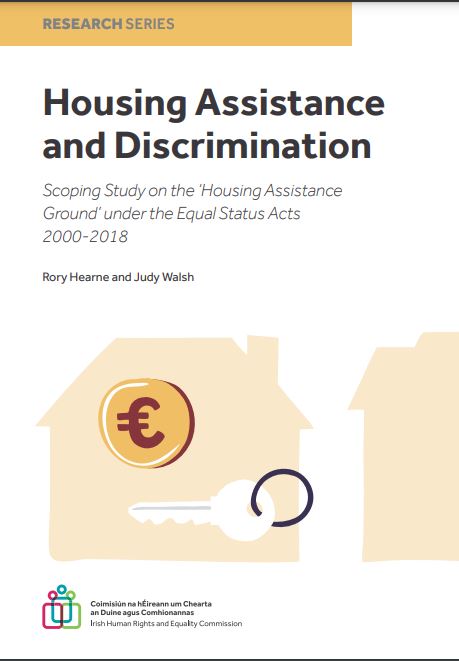Tenants Cannot Sometimes Even Discover Landlords Address to File Discrimination Complaint
Tenants are often unable to make discrimination complaints about their landlords within the necessary 2 month timeframe because they cannot find out their landlord’s address, new research published today has shown. This is one of several barriers facing tenants and prospective tenants where they face discrimination under the ‘Housing Assistance Ground’ of Ireland’s equality laws.
New research from the Irish Human Rights and Equality Commission (“the Commission”) authored by Rory Hearne and Judy Walsh, entitled “Housing Assistance and Discrimination – A Scoping Study on the ‘Housing Assistance Ground’ under the Equal Status Acts 2000-2018” sets out how tenants face multiple discrimination in accessing, or maintaining, a rented home in Ireland because of their use of Housing Assistance payments. The findings come at a key moment, as the Government reviews Ireland’s equality laws.
The report sets out that despite the fact that this discrimination is illegal under law, discrimination continues to take place on the housing assistance grounds and is experienced by those in existing tenancies, and those seeking places to rent.
The report highlights barriers to access to justice where those discriminated against have to pursue their cases to seek vindication. This includes:
- fear of victimisation,
- the lack of alignment between the Residential Tenancies Board (RTB) and WRC,
- issues related to the compensation ceiling and notification requirement,
- and the length of time involved in making WRC process, which undermines the effectiveness of legal remedies.
The report also highlights the need for the Residential Tenancy Board to be empowered to share information with the WRC and other statutory bodies where appropriate (e.g. Revenue in the case of unregistered landlords).
Among the reports 14 recommendations for specific reforms proposed to strengthen protections for tenants in protecting their rights and ensuring access to legal remedies are amending the Equal Status Act to:
- Prohibit harassment on the housing assistance ground.
- Remove the compensation ceiling to enable WRC awards to reflect the harm caused by the more detrimental instances of discrimination.
- Allow organisations to refer a complaint to the Workplace Relations Commission (WRC) on behalf on an individual.
- Address the fact that there is no legal obligation for a landlord to provide a tenant with their address, and if a landlord cannot be served, it is a significant barrier in tenants accessing justice in cases of discrimination.
The research identified subgroups affected by housing assistance discrimination including, single parents, Travellers, Roma, people living in Direct Provision, those with larger families, and those with a disability.
The Commission has worked to combat discrimination in housing for many years including through its legal work in the courts. In each year between 2016 and 2020 the percentage of public queries to the Commission specifically on Housing Assistance related discrimination was consistently between 70 and 79% of all private rental queries, with an average of 124 cases per annum.
Sinéad Gibney, Chief Commissioner of the Irish Human Rights and Equality Commission said:
“The reality is that people who suffer discrimination on the Housing Assistance ground, are often desperately seeking accommodation, and getting involved in a formal complaints process is the last thing on their minds as they seek a roof over their heads for themselves and their families.
“This report shows that much more needs to be done to tackle systemic discrimination against tenants in receipt of housing assistance and proposes a number of clear and tangible recommendations to achieve this.”
ENDS/
Notes to editors:
The full report can be accessed at the following link:
Housing Assistance Ground of Discrimination: With effect from 1 January 2016, ‘housing assistance’ may be invoked as a discriminatory ground under the Equal Status Acts 2000-2018 (the ESA). People in receipt of rent supplement, housing assistance payments, or other social welfare payments, are protected from discrimination in the provision or termination of accommodation and related services or amenities.
For further information, please contact:
Brian Dawson, IHREC Head of Strategic Engagement,
087 0697095
Follow us on twitter @_IHREC
